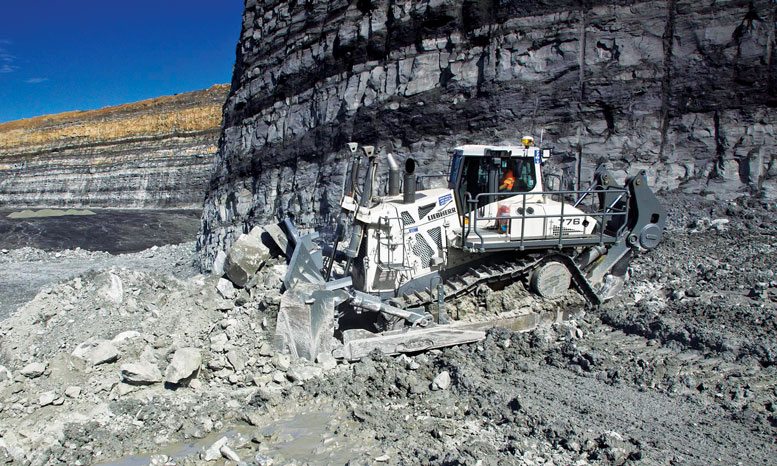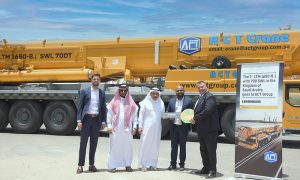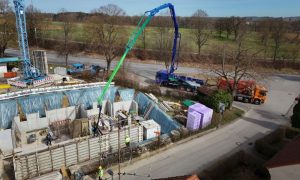Teutonic titans: German machinery giants forge ahead
Manufacturers from the country are capitalising on their brand values and local support networks to push sales in an off-peak regional market

Whether it is the world of consumer automobiles, precision instruments, machinery or construction equipment, the “Made in Germany” label instantly conjures up expectations of the highest quality and reliability.
With a tradition of meticulous attention to detail and highly efficient manufacturing going back for as long as one can care to remember, it is no wonder that German products have carved a niche and a reputation in the market that is synonymous with the highest quality.
And the field of construction machinery is no exception to this. Mention the names Liebherr, Putzmeister, Hamm, Vogele or any other of the famous German brands to a builder, contractor or fleet-owner and the impression you will get is of respect and admiration for quality, reliability and meticulous back-up support.
Competitiveness in the construction machinery sector is certainly a talking point in the region, thanks to the euro falling against the dollar. However, CMME discovers that while the industry’s sales figures are affected by currency fluctuations, this is not the decisive factor.
Quality matters to all equipment users, explain Asif Khan, general manager – Plant & Equipment, and Saif Khan, senior sales manager, Equipment Business Unit, at GENAVCO, one of the top suppliers of German machinery brands in the entire region with big names such as Liebherr and the Wirtgen Group under their belt. In fact, under the Wirtgen Group’s umbrella, GENAVCO offers perhaps the most comprehensive array of road-building machinery that is available from any supplier. The German behemoth is the owner of brands such as Vogele, Hamm, Kleeman and Benninghoven, apart from Wirtgen themselves – all forces to reckon with in the field of road construction.
While Wirtgen manufactures road milling machines, stabilisers, surface miners and pavers, among many others, the other brands in its kitty produce a complete array of road equipment, from asphalt pavers with Vogele and road rollers with Hamm to mobile and stationary crushers and screens with Kleeman and Benninghoven with modular and stationary asphalt plants.
“Now Wirtgen has the full range of road construction machinery, starting from the aggregate to asphalt and road making and maintenance. They are total solution providers,” says Asif Khan.
This comprehensive range followed by their German reputation and full, dedicated service support from GENAVCO has enabled Wirtgen to obtain a stranglehold on the regional market.
“Last year, we commanded 100% of the regional market share for Wirtgen milling machines, which is just one example of the popularity of a German manufacturer. No other brand managed to make even the slightest dent in our sales,” Asif Khan says.
“The perception of our customers is that German machines are the best in terms of quality and product support. People believe that Germans will not compromise – Germans by nature are tough. For this reason, I would say by and large, German brands are enjoying the number one position, in terms of the quality and reliability of their product.”
Support assured
Customers tend to appreciate German construction equipment and machinery because they value the product, but also due to the support associated with German manufacturers, claims Asif Khan. Primarily, all of them take their business very seriously and are customer-focused, and as a result customers prefer German-made products.
These thoughts are echoed by Saif Khan, who points to the fact that another German maker in the GENAVCO stable – Liebherr – holds key advantages in the current market, notably technical reliability and durability, especially in the challenging heat, humidity and dust levels of the Middle East.
“Liebherr machines have been proven to be very reliable, and as a result, they are accepted by large global companies, all of which have strict safety requirements,” he adds.
This brings us to the issue of safety, one of the major competitive advantages that German technology is a step ahead of the competition in, according to a statement by Johann Sailer, chairman of the German Mechanical Engineering Industry Association (VDMA). This includes the safety of both machines and operators. Further, safety is becoming a decisive purchasing argument among customers globally, claims Sailer.
This may be why, according to the German Federal Statistics Bureau (GFSB), exports of German construction equipment and building material machinery grew 45% from 2005 to 2014.
Another key factor is affecting sales. Manufacturers are increasingly moving their manufacturing operations to China and India, where labour costs are lower. This is having an additional impact in the region, says Asif Khan.
“It’s a small market, and all the major players from the world over are here. Our competitors are from Europe, and some of them are bringing their products here from China and India, locations where currencies are also down.”
He is keen to point out, however, that the location in which the machinery is manufactured does not have an impact on quality, despite a persistent perception in the market. European and American brands that build in China or India maintain the exact same standards of quality as for products made in their home countries, he says.
Future challenges
Looking to the future, they speak of the new challenges facing German manufacturers in their objective to convey advantages in terms of equipment design, electronics and maintenance solutions – all the advantages are related to cost, in light of the rise of Chinese and Indian manufacturers.
Liebherr has experienced “positive development, especially since GENAVCO started representing them”, according to Saif Kahn, who explains that market figures indicate substantial growth in equipment sales last year, which was a stellar year for GENAVCO. While this year has been more difficult so far, the German brands continue to outperform competitors in their respective fields, he adds.
In fact, market figures available with GFSB since the 2009 recession show that in the Middle East, the number of Liebherr machines exported to the region has continuously increased. This indicates that despite ongoing geopolitical turbulence here, there remains a very positive attitude and expectation for German models.
Over at Putzmeister, Jens Bawidamann, head of GCC operations, told CMME in a discussion earlier this year that 2015 was a record one for the concrete equipment supplier. “We had a great year last year which will always be difficult to beat. Our reputation as a cutting edge manufacturer and provider of advanced and quality German technological solutions stood us in good stead when customers were looking to purchase concrete equipment.”
Despite the slowdown this year, he is optimistic the superior performance and reputation of Putzmeister’s machines will hold up sales. “This year has been slow so far, as was expected by everyone. We had expected a major slowdown in sales, but surprisingly, the impact has been far lesser than we had anticipated. Our customers still prefer the quality and reliability of our products,” Bawidamann says.
Upcoming projects in the region such as Expo 2020 in Dubai and the 2022 World Cup in Qatar are seen as key events in the construction calendar for German equipment to be further used. Sailer noted in a recent statement that some construction equipment suppliers have already begun participating in these projects, especially those that supply road, tunnel or building machinery.
With German engineering, durability and safety in high demand, coupled with high service standards from suppliers and manufacturers and quick access to spare parts, there is an optimistic outlook for German construction products in this region, regardless of their manufacturing location.
Ecological advantage: Germans score on green efficiency
Environmental awareness is rising in the region, with numerous private and government schemes, initiatives and campaigns aiming to encourage sustainability.
Since many German machinery companies offer highly efficient equipment, they hope to participate in the growing energy cost and environmental awareness drive in Middle East markets. Companies are concentrating on developing ways of using raw materials and resources more efficiently, in addition to enhancing quality and automation and facilitating integration in product processes.
Comparative advantages of German equipment in this pursuit include innovative construction methods and new drive systems – in addition to safety and combining function and design, cost-efficiency and new service concepts. With more limitations on working permissions for expats, companies that can supply efficient automated systems to replace manpower will benefit from new opportunities.















